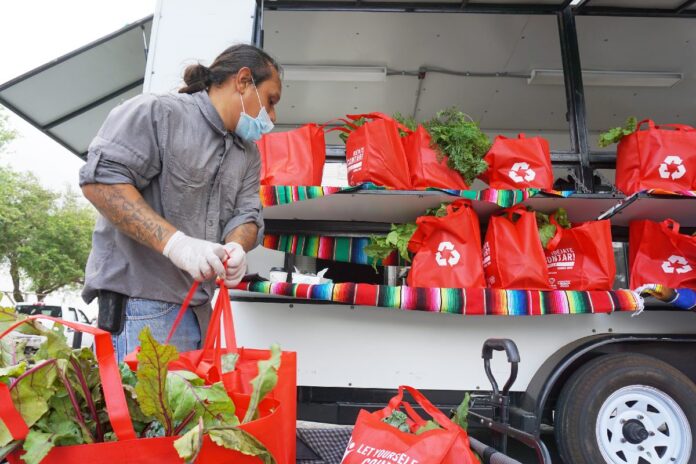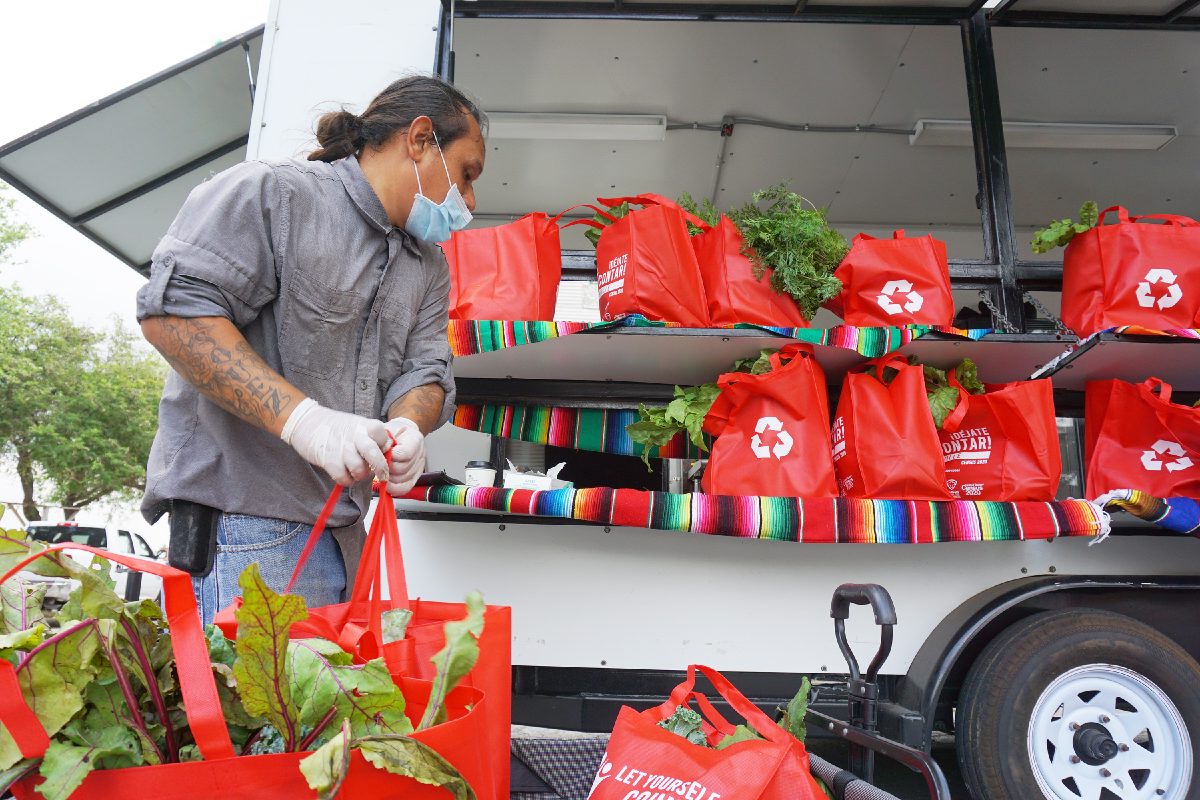The Rio Grande Valley’s farmers and their contracted workers are some of the hardest-hit in the community as cities and counties issue shelter in place orders to prevent the further spread of the novel coronavirus, COVID-19, among residents.
Cameron County’s shelter in place order has meant the closure of farmer’s markets, farm workers afraid to go to work, and a barrage of extra labor for local farmers who must harvest and sell much-needed produce underneath a broken supply chain.
Ernesto and Irma Martinez, who run Laura’s Grapefruit and the Martinez Citrus Farm in Bayview with their daughter Laura, said farmers in the area have been devastated by a series of setbacks this year. “The coronavirus came in at the wrong time. It’s a time when you want to sell your product. People can’t get out,” said Ernesto.
The family normally contracts workers to help pick, clean, bag, and transport fruit on the 20-acre citrus farm. They also run a cattle ranch, for which they’ve been unable to find contracted help due to the shelter in place order. Cattle prices were also driven down by a cattle tick quarantine, for which farmers must spray cattle every time they move the animals.
“Everything that happens involves people,” said Ernesto. “When you look at the maintenance, you need people. When you look at the selling, you need people. When you look at the buyers, it’s people. You can imagine the stress on any business.”
Locally, farm workers who are undocumented may be deterred from driving to work by the extra presence of law enforcement, an issue raised by local organizers in contact with workers across the Valley.
Early this year, an invasion of the Mexican fruit fly prompted quarantine across sections of Cameron County, a huge blow to local citrus farmers. No fruit can be transported in or out of the areas until the fly is eliminated, according to the U.S. Department of Agriculture (USDA).
Ernesto explained that growing season runs from June to November and that the short window to sell the produce — December to May — was cut short not only by COVID-19, but also by the quarantine. “On February 14 we were notified by the USDA that we could no longer sell fruit. We had to stop selling at home. We were preparing to hit the farmer’s markets,” he said.
Initially, the family was told by the agency they could spray the crop and distribute it within 30 days. The USDA came back and asked the farm to remove the fruit from its citrus trees and bury them, sending a crew of people to pick the fruit, dig holes in the ground, and bury the crop 10 feet underground. Now, there’s concern that farmers will have to replant the trees damaged by the pests.
“The whole crop was gone. They made an exception for us to keep 10 to 20 percent of our fruit so we can juice it,” said Ernesto. Juicing the remaining grapefruit was the only way farmers in Bayview could produce income from the season’s yield.
“They can juice it, and that’s it. And then you have to take precautions on the rinds. That adds more work to it. Since you can’t get workers right now, it forces us to do it all ourselves,” he said.
Irma said the family distributes at five different markets — in Brownsville, on South Padre Island, in Harlingen, Pharr, McAllen, Raymondville, and even Corpus Christi. The farm also supplies Four Corners Brewing in Dallas in addition to Winter Texans and many smaller vendors, who travel across the country to purchase the Martinez’s Rio Red Grapefruits. “It’s a lot of work, a lot of effort to make sure our customers are happy. This year I have to tell them they can’t take anything. We don’t have grapefruit. They’re so sad to hear this,” she said.
According to the couple, dry farmers, some whom lease land on their farm, have struggled this year with less rain than usual. Some have taken out loans and are struggling under current conditions. “I feel for all the farmers and the ranchers across the Valley. I don’t know that we can survive another year like this.”
Ernesto emphasized, “Our leaders are making the right decisions. We have to fight this invisible enemy of ours and we have to defeat it.”
Part of the solution is happening locally. On Thursday morning, staff at the Brownsville Wellness Coalition worked in gloves and masks, unloading boxes of freshly-picked, organic produce for distribution to customers and residents in need through the coalition’s Fresco Mobile Market, set up at Ringgold and 6th Street.
BWC has been running the market three days a week and is also making deliveries to residents who cannot leave their homes. The coalition’s 35 vendors and 12 farmers who rely on farmer’s markets to sell product are without buyers. The bundles provide a bit of economic relief while also boosting the immune systems of those in quarantine, staff explained.
Logan Gowen, a staff member helping maintain BWC’s urban farms, said that many grocery stores have chosen not to buy produce in favor of in-demand items like hand sanitizer and toilet paper. “That really hurts local farmers. Because unlike toilet paper, you can’t store organic produce,” he explained.
“We’re trying to connect farmers with people so they can keep a stream of revenue going in this hard time, where something like 20 to 30 percent of Americans lost their jobs. Some grocery stores have contacted us, out of concern for the farmers, to potentially help us pay for buying the produce.”
BWC’s Director Veronica Dimas-Rosenbaum emphasized that farmers left without staff are having difficulties with production and transport. “All of the farmers have been impacted. They are harvesting, putting produce in boxes, and bringing them over to us,” she said.
“The farmers don’t have the capacity to be able to transport produce over to pantries or people like us, so we’re having to help them.”
Farmer David Vasquez maintains his own acre of land and provides produce for BWC’s The Happy Kitchen/La Cocina Alegre program. He argued the shutdowns have revealed how important farm workers and sustainable agricultural practices are to the health of the community.
“To be a farmer, you really have to love what you do. I wake up every day doing this — check on the plants, water the plants. Then there’s spraying, planting, replanting, starting seeds. This is hard work. And it’s satisfying work,” he said.
“It’s very important to understand that we need to adapt. In times like these — you can’t find tomatoes at the store. I go out in my garden and I harvest tomatoes. I have carrots, I have beets, I have cilantro. I have lettuce. Whatever it is I need, I have access right outside my door.”
Vasquez said one of BWC’s farmers, a 70-year-old woman, uses rotational grazing to preserve nutrients in the soil and does the majority of the farming herself. “She’s been at the farmer’s market for years now. I was out there with her in awe of all the work she does by herself — the carrots and the onions and the beautiful produce she grows,” he said.
“At this time — when nobody knows what to do — I know what I’m doing. Every day I wake up and I’m out in the garden. Yesterday, in our urban farms, I was out there planting tomatoes, peppers, okra. We have corn growing.”






